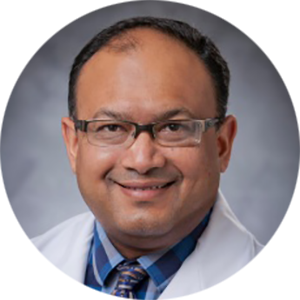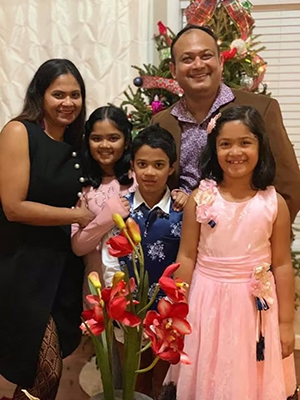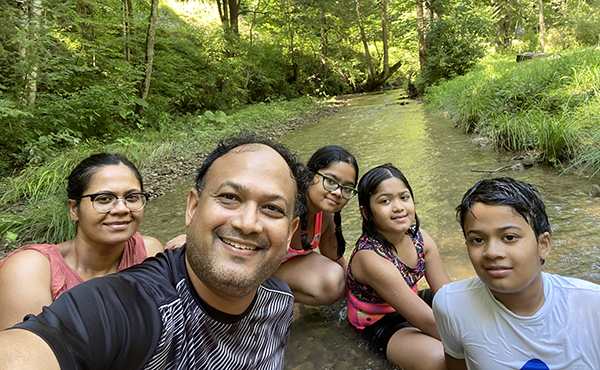
This issue's Faculty Spotlight shines on hospital medicine physician Samrat Das, MBBS. Das talks to us about his current responsibilities as director of undergraduate medical education for the Department of Pediatrics and director of the children’s procedural sedation unit. Notably, he became serious about pursuing a career in medicine in high school, and he explains why the specialty of hospital medicine particularly suits his personality. He talks about what he enjoys most about his work and provides some valuable advice for students and trainees.
How long have you been at Duke? How did you decide to come here?
I joined Duke in August 2017. I decided to come here due to the excellent reputation of the department, high complexity of patients to learn from, outstanding faculty and opportunities for career development. Additionally, this was a great area to raise our 3 children.
What are your current responsibilities within the Department of Pediatrics? What does your typical day look like?
Last year, I took over as the director of undergraduate medical education for pediatrics, and I am responsible for the educational program for Duke medical students during their pediatric clinical rotations. In this role, I am responsible for the education of medical students in providing medical care to the pediatric population and promote careers in pediatrics and its affiliated specialties. I am also the director for the children’s procedural sedation unit which provides moderate sedation services for different procedures on an outpatient basis. Clinically, I work as a pediatric hospitalist where I work with a team of resident, medical students to take care of hospitalized children. My typical day varies based on if I am on service. When I am on service, I start very early in the morning reviewing patient charts, followed by rounding with a multidisciplinary team and the afternoon is spent on follow up on patient care and teaching. When I am not on service, it is planning and administration of the pediatric clerkship, attending meetings, meeting with students, and designing curriculum. I am also engaged in quality improvement activities in the field of hospital medicine and administrative activities for pediatric sedation unit.
How and when did you initially become interested in medicine? What made you decide to pursue a career in pediatric hospital medicine in particular?
I became serious about my career choice in high school. After careful research about the different options, I became interested in medicine because it suited my personality. I wanted something where I could talk to a huge range of people, be challenged to leave my ‘comfort zone’ and be humbled by what I saw. Caring for patients as people really is at the heart of medicine, and it’s a great privilege to be able to help people when they are in most need. I also wanted an altruistic career where integrity is important, and I am glad I chose medicine.
I have always had a generalist approach and never fell in love with one organ system. I was drawn to pediatric hospital medicine because of the great privilege to care for families and patients who are sick. I find the ability to work with and serve families and patients while they go through a challenging hospital admission rewarding. Additionally, the chance to lead daily and a chance to teach and be a role model for the next generation of physicians is highly attractive.
What do you see as the biggest current challenges and opportunities in the field of pediatric hospital medicine?
These are exciting times to be in the field of pediatric hospital medicine as it is the newest subspecialty in Pediatrics. However, the number of fellowship positions currently being offered would be unable to meet the requirements of the field. The limited PHM fellowship positions may adversely affect the pipeline of pediatricians pursuing PHM and poses a major challenge. Major efforts to support institutions in creating and expanding fellowship programs will be needed to address the potential shortage of fellowship positions. However, the biggest opportunity in the field of PHM comes from the culture of collaboration within PHM. There are several hospital-based learning networks like PRIS and Value in Inpatient Pediatrics (VIP) actively working to strengthen our knowledge base and improve healthcare quality. With the rapid growth of scholarly networks in research, QI, and education, PHM has a solid infrastructure on which it can continue to develop as a subspecialty.
Is there any research or other special projects you are doing or plan on doing?
I am working on developing an educational project on how 2nd year medical students rate their own level of comfort in communicating with patients or families and how that differs from family’s perception of medical student skills.

What do you enjoy most about your work?
I love working in a multidisciplinary team taking care of hospitalized children, explaining the plan and answering questions from families. I love having the opportunity to role model compassionate patient care to the next generation of physicians. More importantly, I love the work atmosphere at Duke where every individual strives to work towards providing the best patient care possible.
You currently serve as the Director for Pediatric Medical Student Education. Do you have any advice for students and trainees?
We need physicians who are willing to listen and are compassionate. It is very important to understand the social determinants of health to be able to provide proper care. Have a strong commitment to compassionate care and inspire others to do the same.
It is very important to recognize the importance of the physical examination. When you examine a patient, if you think about it, it is also a timeless ritual, a crossing of a threshold. You stand there not as yourself, but as the doctor, the latest in that lineage harking back centuries. Patients have given you the privilege of touching their body. If you listen well and examine them with some skill, it is going to first avoid the embarrassment of missing obvious things. But then, more importantly, the ritual properly performed earns you a bond, a connection. The ritual is timeless, and it matters. Celebrate the ritual. With every year of practice, be better at it than you were the previous year, develop the skill just as you develop your knowledge.
Medicine is so heterogeneous. Once you determine what success means for you, it’s about finding the right mentors to get you there. Do not underestimate the importance of having good mentors.
What passions or hobbies do you have outside of Duke?
I love traveling, hiking, and stargazing. While traveling to faraway places has been challenging during the pandemic, we explored new hiking trails in North Carolina over the past year and found some great spots for star gazing. Pre-Covid times, I used to love watching my kids play basketball, soccer, and tennis.
